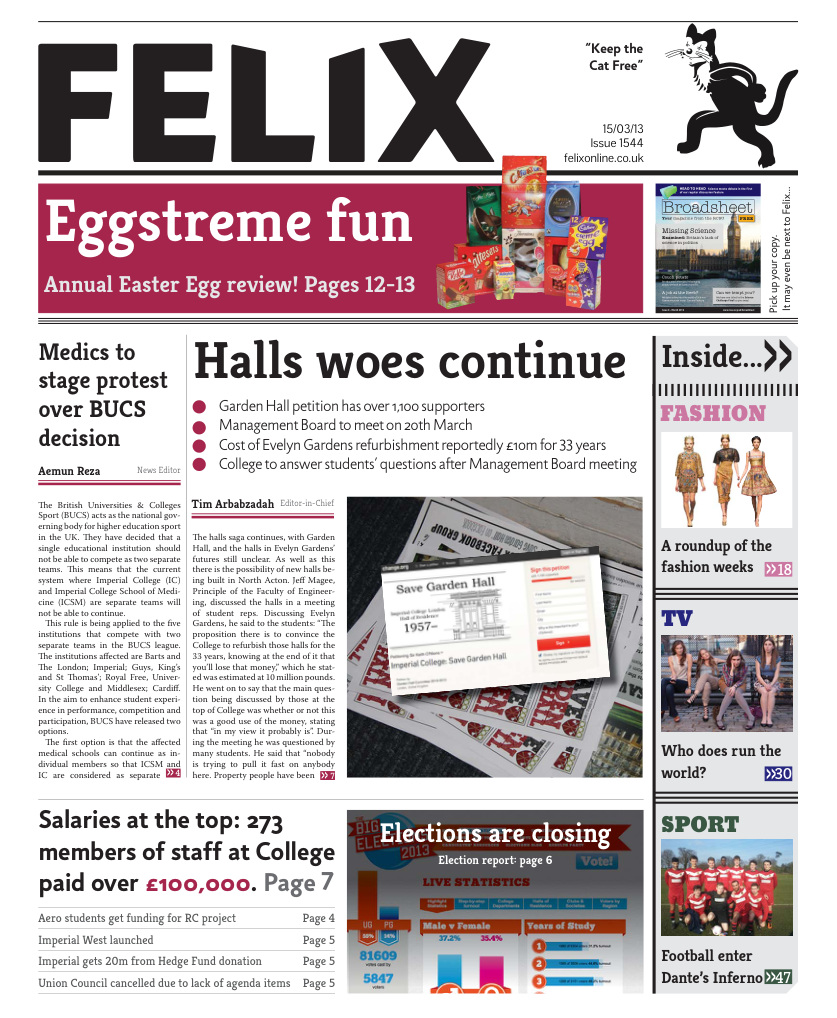Felix and Democracy
To what extent is Felix a democratic body? Can it claim to represent the wider student body? Navid Nabijou investigates

Last night I was browsing The Big Elections website, pondering my choices of candidates. I decided to watch the Meet the Candidates video: partly because I was getting a bit lost amidst the endless succession of naïve and generic manifestos, but mostly for the comedic gold I’d been hearing about (“it’s known that most young men will engage in an element of burlesque in their lives…”). I should mention at this point that if you haven’t already seen the video I couldn’t recommend it highly enough.
During the sofa sit-down with the candidates for Felix Editor, our unflappable host Frank posed a genuinely interesting question: “You’ve all hit on the idea that Felix is the voice of Imperial. Is not the student council the voice of Imperial?”
The answers were broadly speaking muddled and light on content, befitting of politicians on campaign. But the question itself stuck with me. Is Felix a representative voice? Does its editorial policy reflect the views of the wider student body?
To me the answer isn’t obvious. On the one hand, Felix is ultimately run by a very small group of people: the Editor-in-Chief and the section editors. They basically get the last say on which content goes in and which doesn’t. They also get to prioritise certain articles over others, by giving them greater prominence in terms of layout. All this means that in principle they could choose to disregard input from the wider student body, and instead use the paper as their own personal megaphone.
However in practice the editorial policy is extremely open when compared with other newspapers. We view it as part of our duty to provide a medium for student expression, and as such we will only outright reject articles in the most exceptionalcases (e.g. blatant racism or sexism). Of course an inevitable consequence is that a fair deal of substandard material finds its way in; but this usually seems preferable to excluding students from what is, after all, their own newspaper.
But despite this editorial openness, the majority of students probably don’t view Felix as being ‘their own paper’, in the sense that they don’t feel at all engaged in the production process. The pool of contributors – though wider than the editorial team – is still relatively small, with a few dozen high-frequency writers filling the majority of column inches each week. Despite the continual (and highly inventive) “write for us” adverts that appear each week encouraging people to get involved, the unfortunate fact is that the paper is by and large created by a close-knit group of people. To what extent this is alienating to others I’m not sure (the candidates were also asked “how do you intend to stop Felix becoming just an in-joke for the people who write it?” so maybe this is an issue people have raised) but in either case it certainly means that the paper isn’t representative of the students in any direct sense.
What happens instead then is a form of self-selection. The students who want their voices to be heard, and who care enough to put in the required time are those whose views are put out there. The rest – the ‘silent majority’, to channel Richard Nixon – get sidelined.
And so in many ways, representation through Felix resembles representation in any democratic system, where – despite every vote being equal – the politically-engaged classes inevitably end up dominating the discussion. Which brings me back to the original question: “Is the proper voice of students Felix, or the Union Council?”
As with Felix, there is a massive self-selection element at play in terms of who sits on Council; your average Imperial student probably hasn’t heard of, much less cares about the Union Council. Consequently the kind of people who attend Council and vote on Union policies can hardly said to be representative.
But they’re elected by the wider student body, right? That has to count for something. While they are technically elected, these polls don’t take place during the ‘Big Elections’ season (an omission you may not have noticed this week), and so tend to have dismal turnouts; most people on Union Council hold that position by virtue of fewer than one hundred votes. By contrast, the Felix Editor is a sabbatical position that is very publicly contested during campaign weeks, and the winner usually receives a mandate of a few thousand votes.
Finally, any student can turn up to the Felix office and get writing, whereas non-Council members do not have any power to influence the Union’s decisions. So Felix is crucial in empowering ordinary students to make an impact, inasmuch as it provides a medium for bringing important issues to the attention of the Union and sparking discussion within the student body. And while it may never be fully representative of all students, every student has the ability to make it more representative, by heading down to the office and getting stuck in.




